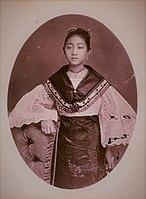
Photo from wikipedia
ABSTRACT This qualitative study investigates the language socialization experiences and identity construction of a group of Chinese students when they interact with their international peers, in a transnational university in… Click to show full abstract
ABSTRACT This qualitative study investigates the language socialization experiences and identity construction of a group of Chinese students when they interact with their international peers, in a transnational university in China. This study is informed by the recent critical ethnographic sociolinguistics studies (e.g. Blommaert 2010), language socialization (Duff 2007; Schieffelin and Ochs 1986), and the post-structuralist conceptualization of identity (Norton 2000). Drawing on interview and observation data, this study finds an asymmetrical power relationship between Chinese students and their native-English-speaking peers in conversations, which precipitates the separation of the two groups on campus and pushes Chinese students into a vulnerable ESL speaker positioning. This study indicates that the asymmetrical power relationship, in spite of its existence, tends to be hidden under the cloak of intercultural difference and taken as a natural and granted convention. Moreover, the findings suggest that the intercultural communication in this transnational higher education context provides a space for reciprocal language socialization in which the Chinese students are empowered to construct a multilingual Chinese identity, which opens up possibilities to interculturalism.
Journal Title: International Journal of Bilingual Education and Bilingualism
Year Published: 2018
Link to full text (if available)
Share on Social Media: Sign Up to like & get
recommendations!